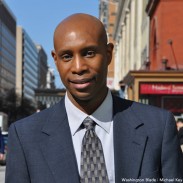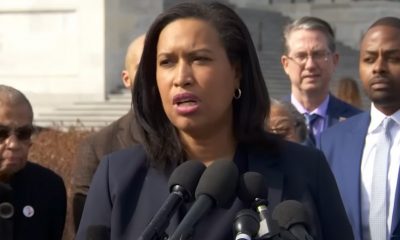Local
Gay couple seeks to block U St. liquor licenses
Nightlife advocates say ban on new bars stifles development


Gay Republican activist Marc Morgan said a moratorium on liquor licenses would hurt economic development in his area. (Washington Blade photo by Michael Key)
Gay former Advisory Neighborhood Commissioner Ramon Estrada and his partner, civic activist Elwyn Ferris, are playing a key role in what many believe will be a heated battle over whether the city should ban all new bars and restaurants with liquor licenses from opening in the rapidly developing 14th and U streets, N.W. corridor.
The recently formed Shaw-Dupont Citizens Alliance, for which Ferris serves as secretary and Estrada is a member, and the lesser known Residential Action Coalition, filed a petition in December with the city’s Alcoholic Beverage Control Board calling for the moratorium.
Gay nightlife advocates, who strongly oppose such a moratorium, acknowledge that the proposal isn’t directed at gay bars or the gay community. But similar to their straight counterparts, they say the proposal would stifle economic development in a vibrant area where large numbers of LGBT people have moved because they embrace the nightlife amenities.
Neither Estrada nor Ferris returned a call from the Blade seeking their views on the issue.
Joan Sterling, president of Shaw-Dupont Citizens Alliance, said Estrada and Ferris are working with her in advocating for the moratorium. She said the moratorium is needed to help reverse what she believes is an alarming rise in crime, parking problems, trash and neighborhood disturbances due to the “over concentration” of liquor serving establishments.
“The issuance of further licenses in the zone would only exacerbate the problems that already affect our neighborhood,” said Sterling, who co-signed the 18-page petition her group and the Residential Action Coalition filed Dec. 10 with the ABC Board.
Opponents of the moratorium have lined up close to 800 people who signed an online petition urging the ABC Board to reject the proposal. Many of them, including gay nightlife advocate Mark Lee, argue that it’s unfair to blame all or most of the crime and other neighborhood problems on bars and restaurants.
They note that existing liquor license moratoriums in Georgetown, Dupont Circle, and Adams Morgan have not curtailed the problems they were supposed to address and, in some instances, resulted in vacant buildings that could have been occupied by restaurants.
“The Logan Circle, U Street and Shaw neighborhoods with large numbers of gay and lesbian residents overwhelmingly support the diverse dining, socializing and entertainment options we enjoy much more than we are willing to tolerate a tiny pseudo citizens group claiming to represent us while pressing for a liquor license moratorium,” Lee told the Blade.
“We don’t want to freeze development in a huge swath of our city with a rapidly growing population,” he said. “We want existing venues to grow and new establishments opening to meet rising demand and attracting other retail businesses…We want to preserve the vibrant community life that caused us to make these areas our home.”
Lee is a regular Blade columnist.
Sterling dismisses these arguments, saying there are 107 existing liquor licenses in the proposed moratorium zone.
“How can anyone claim this won’t remain a vibrant area for bars and restaurants?” she said.
The proposed moratorium would cover a circular area with an 1,800 foot radius, with the middle of the 1200 block of U Street being at the center. Small sections of neighborhoods in Dupont Circle, Logan Circle and Shaw would be covered along with U Street between 15th Street and 8th Street and surrounding streets.
In its northern most point, the area would extend to Clifton Street and its southern boundary would extend to R Street.
Gay ANC Commissioner Alexander Padro, who also serves as executive director of the community group Shaw Main Streets, Inc., said the proposed moratorium’s ban on new restaurants would have a harmful impact on Shaw.
“Restaurants are an important part of the quality of life that residents are seeking and supporting with their dollars,” he told the Blade. “Making it impossible for a newly constructed or newly vacant retail space to house a restaurant or bar could result in a long-term vacancy that would have serious repercussions for the property owner and the community.”
Under provisions of the city’s liquor law, the ABC Board is required to give “great weight” to the views of Advisory Neighborhood Commissions on liquor licensing matters, including a proposed moratorium. Padro’s ANC, ANC 6E; ANC 1B, which covers the 14th and U Street area; ANC 2F of Logan Circle, and 2B of Dupont Circle will all be weighing in on whether or not the moratorium should be approved.
Representatives of each of the four ANCs told the Blade they are currently assessing the views of the residents of their districts on the matter. Matt Raymond, chair of ANC 2F, and Noah Smith, a member of ANC 2B whose district is within the proposed moratorium area, said the four ANCs may hold a joint public hearing on the moratorium proposal in the next month or two.
“If we come to similar conclusions, our great weight will be ever greater with the ABC Board,” Smith said.
Gay Republican activist Marc Morgan, who was re-elected in November to his ANC 1B01 seat, said he too believes a moratorium would hurt businesses and economic development in his ANC area.
“We want to come up with a strong plan to address the problems raised by the advocates for a moratorium,” he said. “I don’t think a moratorium is the best way to address those problems.”
None of the ANC officials contacted by the Blade were willing to predict how their commissions would vote on the moratorium. However, sources familiar with the ANCs impacted by the moratorium have said at least three of the four ANCs are leaning against such a moratorium and would likely vote to oppose it.
If the ABC Board should vote to deny the moratorium petition, the matter would end, according to observers familiar with the process. However, if the board votes to approve it, the D.C. City Council has the authority to make the final decision on the matter.
Gay D.C. City Council member Jim Graham (D-Ward 1), who chairs the committee that oversees liquor licensing matters and in whose ward most of the moratorium zone is located, said he wants to hear from his constituents on the issue before taking a position. Council member Jack Evans (D-Ward 2) feels it is “premature” to weigh in on the issue, according to his communications director Mark Bjorge.
Kathryn Eckles, president of the Residential Action Coalition, told the Blade that although she and her group strongly support the moratorium, the RAC did not hold a meeting to officially vote to file the moratorium petition with the ABC Board.
ABC licensing consultant Andrew Kline, who specializes in liquor licensing and liquor law issues, said the law requires organizations filing a petition seeking a liquor license moratorium to hold a meeting with an advance notice to give all members of the organization an opportunity to vote on the issue.
It couldn’t immediately be determined whether the RAC’s apparent failure to hold a meeting to vote on the issue would disqualify the group from having legal standing to file the petition.
District of Columbia
Two charged with assaulting, robbing gay man at D.C. CVS store
Incident occurred after suspects, victim ‘exchanged words’ at bar

D.C. police just after 1 a.m. on April 10 arrested two men for allegedly assaulting and robbing a gay man inside a CVS store at 1418 P St., N.W., according to a police report and charging documents filed in D.C. Superior Court.
The charging documents state that the alleged assault and robbery occurred a short time after the three men “exchanged words” at the gay bar Number 9, which is located across the street from the CVS.
The arrested men are identified in the charging documents as Marquel Jose Diaz, 27, of Northwest D.C., and Lorenzo Jesse Scafidi, 21, of Elizabeth City, N.C. An affidavit in support of the arrest for Diaz says Diaz and the victim “were previously in a relationship for a year.”
Court records show Diaz was charged with Simple Assault, Theft Second Degree, and Possession of a Controlled Substance. The court records show the controlled substance charge was filed by police after Diaz was found to be in possession of a powdered substance that tested positive for cocaine.
Scafidi was charged with Simple Assault and Theft Second Degree, the court records show.
The D.C. police report for the incident does not list it as a suspected hate crime.
The court records show both men pleaded not guilty to the charges against them at a Superior Court arraignment on the day of their arrest on April 10. The records show they were released by a judge while awaiting trial with an order that they “stay away” from the victim. They are scheduled to return to court for a status hearing on May 21.
The separate police-filed affidavits in support of the arrests of both Diaz and Scafidi each state that the two men and the victim “exchanged words” inside the Number 9 bar. The two documents state that both men then entered the CVS store after the victim went to the store a short time earlier.
Scafidi “came into the CVS shortly after and entered the candy aisle and slammed Complainant 1 [the victim] to the ground causing Complainant 1’s phone to fall out of CP-1’s pocket,” one of the two affidavits says. It says Scafidi “again picked up CP-1 and slammed him to the ground.”
The affidavit in support of Diaz’s arrest says Diaz also followed the victim to the CVS store after words were exchanged at the bar. It says that after Scafidi allegedly knocked the victim down in the candy aisle Diaz picked up the victim’s phone, “swung on” the victim “while he was still on the ground,” and picked up the victim’s watch before he and Scafidi fled the scene.
Without saying why, the two arrest affidavits say Diaz and Scafidi returned to the scene and were arrested by police after the victim and at least one witness identified them as having assaulted and robbed the victim.
Attorneys representing the two arrested men did not respond to phone messages from the Washington Blade seeking comment and asking whether their clients dispute the allegations against them.
The victim also did not respond to attempts by the Blade to obtain a comment from him. The police report says the victim is a resident of Fairfax, Va.
District of Columbia
Bowser calls for ‘extraordinary’ response to reduction in D.C. budget
Impact on city funding for LGBTQ programs and grants unclear

D.C. Mayor Muriel Bowser on April 15 issued an executive order calling for “extraordinary actions,” including “significant cuts in District Government services,” to address a decision by Congress to cut the city’s current budget by $1.1 billion.
The nine-page executive order points out that these actions became necessary after the U.S. House of Representatives has so far declined to vote on a free-standing bill approved by the U.S. Senate last month that would restore the $1.1 billion D.C. budget cut initially approved by the House.
In addition to large-scale cuts in city services, the mayoral order says the congressionally imposed city budget cut will bring about city “hiring freezes, financial impacts to employees, reductions and terminations in contracts and grants, and closures of District Government facilities.”
The order adds, “These are unprecedented actions given that the District itself adopted and is able to implement a fully balanced budget, but they are necessary due to the Congressional cut to the District’s budget and its inaction in timely fixing its legislative error.”
The House adjourned this week on a recess until the end of April, and congressional observers say it is unclear whether the majority Republican House will take up the Senate bill to undo the D.C. budget cut when the House returns from its recess. President Donald Trump has called on the House to approve the bill to restore the full D.C. budget.
Among the D.C. LGBTQ organizations and those providing services to the LGBTQ community that receive D.C. government funding and that could be impacted by the budget cuts are Capital Pride Alliance, which is organizing WorldPride 2025 set to take place in D.C. next month; and Whitman-Walker Health, one of the city’s largest private healthcare organizations that provides medical services for LGBTQ clients.
Also receiving city funding are the Wanda Alston Foundation, which provides housing services for LGBTQ people; and the LGBTQ youth advocacy and services organization SMYAL.
Spokespersons for the four organizations couldn’t immediately be reached to determine if they knew whether the soon-to-be implemented budget cuts would have an impact on the city funding they currently receive.
In response to questions from news reporters during an April 15 press conference call to discuss the Bowser executive order, Jenny Reed, director of the D.C. Office of Budget and Performance Management, said details on specific programs or funding allocations set to be cut would not be known until the mayor submits to the D.C. Council her Supplemental FY 2025 budget along with her proposed FY 2026 budget.
Reed was joined at the press briefing by Lindsey Parker, Mayor Bowser’s chief of staff; and Tomas Talamante, director of the Office of Intergovernmental Affairs.
They and other city officials have said the impact of the congressionally imposed city budget cut was expected to be lessened but remain highly problematic by Bowser’s decision to invoke a 2009 law that allows the city to increase its own spending without approval by Congress under certain circumstances.
The mayor has said under that law, the city would need to cut its FY 2025 budget by $410 million rather than by $1.1 billion. It couldn’t immediately be determined whether House Republicans, who initiated the requirement that the D.C. budget be cut by $1.1 billion, would challenge the mayor’s plan to invoke the 2009 law to reduce the size of the budget cut.
“Without the ability to fully execute the Fiscal Year 2025 budget as adopted and approved by the District, this gap will force reductions in critical services provided by our largest agencies, including the Metropolitan Police Department and the Fire and Emergency Medical Services Department,” the mayor’s executive order states.
“The District will continue to work with members of the House of Representatives to urge them to vote to fully restore the District’s Fiscal year 2025 budget and will continue to work with President Trump to strongly encourage the House of Representatives to take that action,” the order says.
District of Columbia
LGBTQ budget advocates fight for D.C. resources in a tough fiscal year
‘Trying to preserve life-saving services’ amid $1 billion cut

The months and days leading up to June are especially busy for LGBTQ Washingtonians. For one group, the DC LGBT Budget Coalition, which works year-round to ensure LGBTQ residents are represented and financially supported by the D.C. government, this time of year is their Super Bowl. Beginning in April, the D.C. Council and Mayor’s Office hold budget hearings for the next fiscal year.
With D.C.’s budget now under review, the Washington Blade spoke with Heidi Ellis, coordinator of the DC LGBT Budget Coalition, about the group’s top priorities and their push to ensure continued support for queer communities.
“The LGBTQ Budget Coalition was founded in 2020 at the height of the pandemic, as a way for the community to work together to advocate for key funding and policy changes,” Ellis said. “We recognized we were stronger together. A lot of groups are often pitted against each other for resources and dollars. This coalition was founded out of a need for unity. Since then, we’ve successfully advocated for more than $20 million in dedicated LGBTQ investments.”
In addition to coordinating the coalition, Ellis is the founder and CEO of HME Consulting & Advocacy, a firm that helps build coalitions and advance policy initiatives that address intersectional issues in the LGBTQ community. One of its most powerful tools, she explained, is direct outreach through community surveys.
“We actually do community surveys to see what people need and what’s top of mind,” Ellis said. “Of course, we also pay attention to the broader political landscape — like the current threats to HIV funding. That helps us prioritize.”
Because the coalition is comprised of more than 20 organizations across various sectors —healthcare, housing, community organizing — Ellis said its diversity enables it to connect grassroots needs to potential policy solutions.
“Our coalition includes service providers, community groups, health and housing advocates-folks who are deeply plugged into what’s happening on the ground,” she said. “They help determine our direction. We know we don’t represent every queer person in D.C., but our coalition reflects a wide range of identities and experiences.”
The insights gathered through those surveys ultimately inform the coalition’s annual budget proposal, which is submitted to the Council and mayor.
“That’s how we got to our FY26 priorities,” she said. “This year, more than ever, we’re fighting to protect what we’ve already secured — funding and policies we’ve had to fight for in the past. We know there’s concern around this budget.”
One of the challenges this year is that the D.C. government’s operating budget and some of its legislation must be approved by Congress. With a projected decline in tax revenue and a Republican-controlled Congress that has historically opposed LGBTQ funding, the Coalition has had to think strategically.
“Even before the situation on the Hill, the CFO projected lower revenue,” Ellis said. “That meant cuts to social programs were already coming. And now, with the $1 billion slashed from D.C.’s budget due to the continuing resolution, we’re not only fighting for D.C.’s budget and autonomy, but also trying to preserve life-saving services. Our message is simple: Don’t forget about queer people.”
This year’s proposal doesn’t include specific dollar figures. Instead, the Coalition outlines five funding priority areas: Healthcare, Employment & Economic Equity, Housing, Safety & Community Support, and Civil Rights.
Why no exact amounts? Ellis said it’s because not all solutions are financial.
“Some of our asks don’t require new funding. Others build on existing programs-we’re asking whether the current use of funds is the most effective. We’re also proposing policy changes that wouldn’t cost extra but could make a real difference. It’s about using what we have better,” she said.
When drafting the proposal, the Coalition tries to prioritize those with the most pressing and intersecting needs.
“Our perspective is: If we advocate for the most vulnerable, others benefit too,” Ellis said. “Take LGBTQ seniors. Some may have done well in life but now face housing insecurity or struggle to access affordable healthcare. Many in our coalition are elders who fought on the frontlines during the AIDS epidemic. They bring critical historical context and remind us that Black and brown communities bore the brunt of that crisis.”
“I love our coalition because it keeps us accountable to the moment,” she added. “If we center those most marginalized, we can make an impact that lifts everyone.”
In addition to healthcare and housing, safety remains a top concern. The Coalition has fought to maintain funding for the Violence Prevention and Response Team (VPART), a city-supported group that includes MPD, community-based organizations, and the Mayor’s Office of LGBTQ Affairs. VPART responds to crimes affecting the LGBTQ community and connects victims to legal, healthcare, and housing services.
“We’ve pushed to make VPART more proactive, not just reactive,” Ellis said. “The funding we’ve secured has helped survivors get the support they need. Cutting that funding now would undo progress we’re just beginning to see.”
At the end of the day, Ellis emphasized that this process is about far more than spreadsheets.
“A budget is a moral document,” she said. “If we’re not represented, you’re telling us our lives don’t matter at a time when we need protection the most. When people can’t get food, medicine, housing — that has a devastating impact. These are vital services.”
The DC LGBT Budget Coalition is urging residents to support a letter-writing campaign to D.C. Council members and the mayor. You can send a letter here: https://actionnetwork.org/letters/fully-fund-dcs-lgbtq-communities
Read the full FY26 budget proposal here: https://drive.google.com/file/d/1bTrENnc4ZazJTO6LPrQ3lZkF02QNIIf1/view
-

 District of Columbia3 days ago
District of Columbia3 days agoReenactment of 1965 gay rights protest at White House set for April 17
-

 Maryland3 days ago
Maryland3 days agoFreeState Justice: Transgender activist ‘hijacked’ Moore’s Transgender Day of Visibility event
-

 Hungary3 days ago
Hungary3 days agoHungarian MPs amend constitution to ban public LGBTQ events
-

 Real Estate4 days ago
Real Estate4 days agoNavigating DMV real estate market during political unrest












